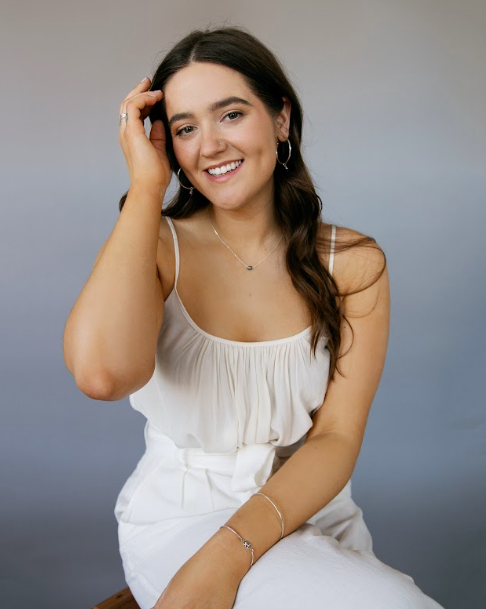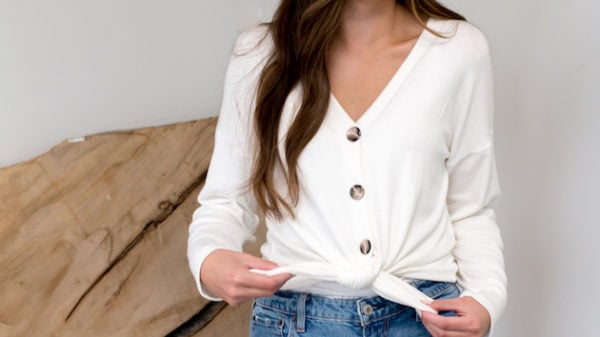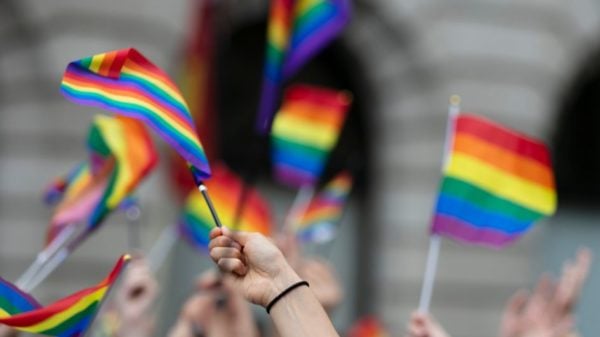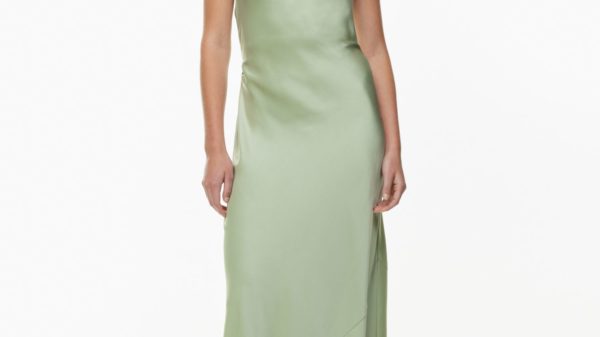On this week’s Let’s Talk About… episode, Elise sits down with Allison E. Lang.
Allison‘s mission is to create a more accessible and body inclusive world by sharing her story with others. She was born missing the lower half of her left leg and has overcome bullying and self-body shame. She’s now a motivational speaker model, and influencer, member of Team Canada volleyball.
Elise and Allison talk about her career, overcoming bullying, educating the younger generation, and bringing awareness to body inclusivity.
“I wrote things that I loved about myself internally and externally… Just like little key things that I took pride in and with that, grew my self-image. Because, I tried so hard to hide my leg forever that when I started to accept it, I didn’t care about what anyone else thought.” Allison tells Elise on Let’s Talk About.
Check out the show’s transcript below.
[00:00:00] Elise: Hi everyone, and welcome to our last episode of Season two as we come to an end of 2022. Today we’re talking about disabilities, advocating for yourself, and body inclusivity with Allison Lang.
Allison’s mission is to create a more accessible and body inclusive world by sharing her story with others. She was born missing the lower half of her left leg and has overcome bullying and self body shame. She’s now a motivational speaker model, influencer member of Team Canada volleyball, which we’ll get into in a bit.
And she really enjoys creating conversation on this topic. So Allison, you were like the perfect person to end off the year with. Congratulations. Welcome back to Canada.
[00:00:38] Allison: Oh, thank you for having me so much.
[00:00:40] Elise: Yeah, thanks so much for being here. I know some people. From the style community might recognize you cuz we have done some IG lives with you in the past.
Um, I’m excited cuz I’m the one that actually gets to have this conversation with you this time, not someone from the team . So you’ve been on my list of people to talk to for some time now, but you know, I wanted to kind of get started with your story, but I think more importantly, let’s get started. You were just sharing with me where you just got back from Bosnia.
Yeah, so congratulations on a silver win. Take us, you’ve been playing volleyball your whole life. I know you’re really into sports your whole life, but how long have you been playing volleyball for?
[00:01:14] Allison: Oh, um, I actually got recruited, so I play with Team Canada. Um, I play sitting volleyball. It’s like standing but a little bit different.
It’s an adaptive sport. Played at the Paralympics and I got recruited when I was 16 years old and played until the age of 21, 22. Took some time. Uh, to focus on university and then rejoined when I was 27, 28. I’m 29 now for reference. And yeah, we just, um, went for worlds in Bosnia and I mean, we had high hopes.
We really wanted to medal and we did. We came home with silver, so that’s pretty exciting.
That’ss huge because when I went to my first world championship in 2010 in Oklahoma, we got 12th place. So in eight we’ve.
[00:02:02] Elise: That’s awesome. Yeah. And I guess you’ve been doing, if you mentioned since you’re, you, it’s been a part of your life for a decade
pretty
[00:02:09] Allison: much, then Yeah, basically, yeah.
I love it though. I play with such amazing women and we on the topic of disability, have a variety of different disabilities on the team, but obviously we’ve overcome adversity and through that show, resilience had come together and I. I’m so excited for everyone learning about this sport that’s listening right now.
Yeah, because I was, was
[00:02:30] Elise: just, just saying Allison, I don’t know anything about volleyball. , so go ahead. That’s ok. If
[00:02:36] Allison: you just, uh, YouTube sitting volleyball, it’s a lot faster than standing. We actually play seated on our butts, which a lot of people don’t think and do. Okay. Um, So we move with our hands if we have them, or our feet if we have them, and scoot around the court to get the ball.
And then slide and attack. The net is obviously lower. Um, I think it’s. Well, it is 1.05 meters for women and 1.15 meters for men. And then the court is smaller, so it’s six by 10 meters instead of the larger size court. So, and then
these
[00:03:09] Elise: are obviously women from across the country. How do you all, I mean, even, and I’m curious about this, you know, in sports in general, I guess I’ve never, not.
Clearly not very sporty, but how do you all pr, like how often do you all practice? Um, how does that work? ?
[00:03:22] Allison: I’m really excited to say this, but I have a break this month just to like Oh, nice. You know, re-energize myself because we’ve been quite Gogo this year, which has been incredible. Um, we are from all across Canada, so we have girls in bc, Alberta, Saskatchewan, I’m in Montreal.
We have girls in Ontario. They fly us into Edmonton. So a majority of the team is located Edmonton and a majority of the staff are located there. So, okay. It’s just more feasible if we fly to one location. Got it. Of a consistent training center. So we meet once a month for five days together. Although a lot of us extend our time before or after training camp to train their, um, full time.
They with the girls that are located there, and we’ve been traveling nonstop this year. It’s been quite incredible. We went to Boston to play a friendly match with the states. We went to the Netherlands to play in a friendly Euro match. No. And. , um, we just got back from Bosnia, so we’re now preparing for Zonals.
We’re hosting Zonals in Edmonton this year, in May. Okay. And we’re quite excited because obviously if we get gold there, we’ll get an automatic qualified. Qualifying birth spot for the Paralympics for Paris 2024, which is our goal right now. Oh wow. Oh my gosh.
[00:04:41] Elise: I feel like you just mentioned all these amazing countries in there too.
So what, like an experience to get to do something that you love and travel to? Some cool, pretty cool places as well. Yeah. But let’s take, let’s like rewind like 29 years . Okay.
[00:04:54] Allison: Okay. Let’s do it. I’m ready.
[00:04:56] Elise: Take it back just a little. So can you tell us, and I wanna start off by just kind of asking the question too.
I know you have, and I’ve listened to you on other podcasts. I know you have a relationship with the word disabled, and you’re kind of owning that word right now, so we’re gonna use that word is that. Fair to say at this point.
[00:05:14] Allison: I, I use it every single day, so let’s use it. I encourage other people to use it and not tiptoe around it because disability isn’t a bad thing, nor is it a bad word.
So let’s
[00:05:25] Elise: Perfect.
[00:05:25] Allison: Break that stigma and start using it day to day. ,
[00:05:28] Elise: get it on the same page there for everyone listening. So can you take us through, like, through your journey? Cuz I’m sure, and I, I know like I’ve read your story. And I can’t imagine the difficulty and like high school time period, how cruel kids probably were.
Take us through a little bit about that, cuz then, I mean, hearing all the amazing things you’re doing now, um, it was obviously a journey to get there, right?
[00:05:52] Allison: Yeah. Can I actually rewind a little bit before high school, just so the listeners kind of know.
[00:05:57] Elise: Oh yeah. Rewind started. Rewind to day one.
[00:05:59] Allison: Okay. Um, for those that don’t know, but like you mentioned, I was born missing the lower half of my left leg at birth.
There was no pre determiners, so my parents had no idea. Ultrasounds all looked okay and when I was born, the doctor. There’s something wrong with your daughter. We’ll be right back. Obviously. Panic. My parents, this is like their first child. I’m the oldest of four, so I can’t even fathom what my mother was feeling at the time.
Yeah. Um, comes back and says your daughter was born missing one of her legs. My parents were quick on their feet. They’re like, well, how are her internal organs? Said Everything else is okay. So cohesively they’re like, okay, that doesn’t matter. That’s fine. And they actually raised me like anyone else with my siblings, threw me into soccer, swim lessons, you name it.
And um, I growing up, started snowboarding when all my friends did and I wanted to do all of those things. Although the only setback for me was the judgment of others, or like people not knowing what disability was and kind of like excluding me and not knowing how to include me. And you know, all these buzz words people are talking about now.
But I remember in elementary, I mean, a lot of it, my memory has blocked out, to be honest. Mm-hmm. , but I was extremely bullied when I was younger in elementary school, both mentally and physically. So I had to get a couple revision surgeries as I would grow taller. So some days I’d go to school on crutches or in a wheelchair and be pushed over and called Barbie or PE leg and oh my gosh, it.
Horrible. There were some days that I would come home crying, telling my mom, I never wanted to go back to school. I didn’t wanna be alive, I didn’t wanna be on this earth, and that it really made me question. Like the universe and entirety, cuz I’m like, if there is a God or if there is some kind of higher power that everybody talks about, why the hell did he put me on earth and choose me to be born with one leg?
Why am I enduring all this pain? And because I thought I was the chosen one in like a negative way, I, I started hating my body. And I’m like, if people hate my body this much, I should too. And so being a young female that only stayed with. After my elementary years of grade six, I asked my parents if I could switch schools because I just couldn’t do it anymore, and I went to a new junior high.
I knew some of the girls from soccer, but I knew nobody else, so I thought this was my clean slate. I didn’t wear shorts even in the summer, plus 30 degree weather, I’d be in pants or I would wear. Like nude tights that would make my two legs look the same. And then like Capris on top. I never showed my knee.
I was trying out for the soccer team, but pulling my socks over my knees to hide my prosthetic. And I became so obsessive about it and there were no comments about my body made in junior high. And I’m like, okay. I, I finally did it. Like no one knows about my disability. It’s okay. And then, Come high school.
Um, obviously there’s locker room talk and I found out that the football team had found out about my prosthetic leg, probably from one of my girlfriends talking because I have sleepovers that’s only natural, and I had a great group of friends that did accept me with it. But I was still scared of the judgment of people that I didn’t know when, now that I’m older, I’m like, it doesn’t even matter what anybody thinks of you. Sure. But hindsight,
[00:09:37] Elise: right? Like now, hindsight, yeah, but I can’t believe it was that. I mean, I guess I can believe, but it’s kind of scary that it was that young, like before grade six. Like I’m thinking of friends that have children that are like in grade two or grade three, and like to be that cruel so young like.
Gosh, that’s, that’s kind of a little bit mind blowing. I mean, it’s not and it is. Right. And I, I wonder if that’s changing a little bit in schools nowadays. But anyway, keep going with your story. Cause I don’t wanna take away from that .
[00:10:10] Allison: No problem. And. I just wanna touch on that. Like I hope things are changing and I, as an adult, looking back, I’m like the people, the kids that I was bullied by were probably in so much pain themselves, right?
That it was just like amplified through that onto me. And I mean, I feel for kids like that and I hope things are changing in the future and. Um, but yeah, sorry.
[00:10:35] Elise: When you do a lot of speaking No, I was gonna say, I know you do a lot of speaking. Is it, is it at all two elementary schools? Like, do you see any of that changing at a younger age?
Right. Cause I, I think we, to your point, like we now, when you’re older, you have social media mm-hmm. , um, you can see that everyone’s different. I’m even thinking of myself. I’m older than you, but like the models looked all a certain way and now we all look, you know, Shown different bodies, which we weren’t before.
Yeah. Um, so I’m wondering, and I’m not in schools very often, like I’m wondering if you are or if you’re in talks with people that are maybe in their teens and if they’re feeling a little bit different than maybe your
[00:11:13] Allison: experience. So funny you ask that. I just wanna touch on the magazine thing, like growing up that nobody ever looked like me in movies or on magazine covers.
No one ever had a disability. Or if they did, they were victimized for it and or if. Look and watch different shows like Glee or even Superstore. The guys that play the ones in the wheelchairs are able bodied in real life. So they’re not even hiring disabled actors, which was right just beyond me. But, um, it’s funny you ask because when I, I have, I graduated, With a certificate of design and then I did my photography diploma.
But after I didn’t feel fulfilled enough. So I went on to get my education degree cuz I wanted to work with kids. And particularly I worked in an elementary school for three years at an out of school care program. and so I worked with kids from kindergarten to grade six and I would try my best just to expose them.
I think like unspoken exposure is also great therapy and like good learning experience. So I would just go and work at the school in shorts and all the kids everywhere would just see me and it became normalized. Like it wasn’t something that you. Really always had to talk about or make a huge deal out of it.
It was just kind of like, oh, there’s Ms. Lang, like she has one leg. Cool. Like onto the next Yeah. Kind of thing. Yeah. And then I did do my practicums in junior high, and even to this day I still volunteer with the War Amps Champ program. They helped fund my recreational limbs when I was a child. So just as an adult, I try to share my story with younger amputees or.
Children that don’t know anybody with amputation, just to kind of let them know that, you know, we are human too. We can do anything we put our minds to, we should be included in sports and activities and like, I think it is changing. There obviously is huge discussion over like diversity now, however, I hope people aren’t.
Talking about those topics to like hit the quota and seem, you know, woke or whatever the term may be. But, um, I do think that schools are changing. I am brought in to talk about, you know, disability inclusion, bullying is a huge one. Um, but I always try to like, make it light, you know, like I’ll bring a bag full of legs and show the kids like, oh, this is what I use for running, this is what I use for high heels.
And it becomes like an. Thing like, it’s so cute. I find little kids will be like, oh, you’re like a super hero, or Mr. Gadget, or something like that because I, I’m like a quarter robot or you know, I try to make it light and like I could see that for a little kid. Yeah. And
[00:13:54] Elise: I ends up being cute. I love the way that it sounds like you’re doing it is really, it’s about exposure in general.
Right. And I think, you know, in my younger years and even teen years, there wasn’t a lot of exposure. I lived in like an Italian Catholic like community. There wasn’t exposure to black people, there wasn’t exposure to the LGBTQ population and. There probably, I remember one specific person who, um, was in a wheelchair, but there’s probably a million other people that had different circumstances that I wasn’t aware of.
But, you know, I, I think that is maybe one of the pluses of the world that we’re living in. And we can see all these different people in the palm of our phone, our hand now. Right. And in our phone. Yeah. Um, and so that, that’s definitely different in the experience. And I would just think to your point now, they’re just like, oh, that’s mis like, of course.
Right. Cause they, they’re exposed to it. At every age now where mm-hmm. , we were so like, and, and do you think that was part of your experience? Do you think the people that were bullying you, was it just that they were so like sheltered or unex? Like do you, I know you mentioned you think that there was like a hurt, like they themselves are hurting, but I wonder if there was also just like an unaware, or I don’t
[00:15:05] Allison: know.
I think it could just be a lack of. Knowledge around it. Yeah, like I would say that it’s still in adults. Like for example, I’ll be at the gym working out and I’ll have people come congratulate me and I’ll be like, why? I’m doing the same thing as you. Like, do I, are you going up to, they’re not going up to everyone in the gym saying, good job, you made it here today.
They’re coming to me. Oh my gosh, you’re so inspiring. Good job. Like, good for you. Look at, you’re
[00:15:29] Elise: probably in better shape than half of them. , but like, it’s awkward,
[00:15:33] Allison: right? I, I started so I used to say thank you. And now, I don’t know if this is like coming off rude, but someone will be like, oh my gosh, you go girl, look at you.
And I’ll be like, why? For what? And then they feel awkward being like, cause who’s gonna be like, oh, because you have one leg. Good job. Like, that’s just weird. But yeah, it’s weird. Yeah. It’s because we’re unexpectedly in those spaces and people think that, you know, we, they have this preconceived notion that people with disabilities are like the ones that are asking for.
Help the most or can’t access places like this or don’t wanna show up, which is true. I didn’t wanna show up to the gym for years, but now I’m comfortable enough to do it, but it’s uncomfortable when I’m still not expect, expected to be there.
[00:16:17] Elise: Mm-hmm. . Mm-hmm. . Totally. What do you think, like, cause it, it sounded like from you sharing your story, there was definitely like darker times.
Was there like a specific situation or something that happened? Caused you to spin, to spin it in your head and and to kind of move into this different space of like, now I’m gonna talk about it, I’m gonna share this story. Or was it like a slow, gradual build
[00:16:41] Allison: to get there? It’s definitely a slow, gradual build.
I don’t want anyone to think, I woke up overnight being like, Hmm, I’m okay with my body today. I still struggle. Yeah. Like I might look confident. I post photos of myself in underwear or showing my leg, but it hasn’t always been that way. I. Worked really hard on my self-love journey, and I would say that it, it.
A continuous journey for the rest of our lives, cuz our bodies will continue to change over time. But I would say that, you know, I, I journaled a lot. I wrote things that I loved about myself internally and externally, but tried to focus on the more important things. Like, you have great friends, great family, you’re funny, you’re smart, you know, you’re outgoing.
Like, just like little key things that I, I took pride in and with that grew like my self image because, I tried so hard to hide my leg forever that when I start started to accept it, I didn’t care about what anyone else thought. And I mean, I’m not saying I wake up every day and I’m like, yeah, I’m so hot.
But like I do wake up and I appreciate the body that I’ve been given because it allows me to do the things that I do every day. And with that, like I’ve, I. Who am I living this life for? Ultimately? Do I wanna continue hiding my leg and dressing in baggy clothes because I’m ashamed of my body? Or should I embellish it and you know, like string lights around my prosthetic leg and like put glitter stickers on it and wear high heels and short dresses and you know, rock it and own it.
And, I like faked it till I baked it. I was just so
[00:18:19] Elise: alive. Well, I think that’s true with a lot of things, right? It’s like you kind of, you act the part till you start feeling the part. So is that, that’s kind of what happened.
[00:18:29] Allison: Yeah. Yeah, absolutely. And now I, I actually love fashion and style and I used to be afraid of the continuous, like fashion changes because for me to try and keep up with a prosthetic.
Was so hard because, you know, I can’t wear a lot of tight pants. I can’t get them over my prosthetic foot, or you know, I didn’t want. To keep getting my leg carved to be the same size as my calf. So if I was wearing tight pants, it would look weird and people would notice, or I didn’t wanna wear dresses and all that kind of stuff.
I never felt feminine enough to wear dresses, if that makes sense. Because everything we were always taught when we were younger was like, oh, be feminine. Be this, like men will like you. I don’t fucking care what men think anymore. You know? Sorry if I’m swearing on here, but like, no, no, it’s totally fine
[00:19:20] Elise: now.
Now I’ll
[00:19:21] Allison: put on a. And my leg, my prosthetic leg. For those that don’t know, I used to obsess about getting it finished and having it the same color and the same size, and now I don’t even have a cover on it. It’s just a metal rod. And so I put on a dress and I’m like, yeah, I feel like a rock star today.
Like I’m edgy, I’m, this is my personality. I’m rough around the edges. Why do I wanna fit this mold of somebody else? It does take
[00:19:45] Elise: time a lot more and I, I appreciate that and I kind of want to just have a little bit of an open conversation about this. What are the things that, cuz you mentioned like putting the jeans on, right?
Mm-hmm. , like, I wouldn’t have really thought of that, right? Like, I wouldn’t have thought of the size of the foot and getting, what are some of the things that like, we just don’t, you know, might not realize that you would’ve had to. Find a workaround for, right? Like whether it’s tight jeans, skinny jeans, that you would’ve been in that trend.
Gosh, I dunno. Is that, I can’t keep up with the gene trend, but yes. Like I’m for this wide leg. What? I love it. But what, what were the other, and you mentioned too, like the picking the right color for the prosthe. I wouldn’t have even thought through that. Like what are the things that we don’t know about?
There’s probably so much, but just number one is how
[00:20:33] Allison: expensive prosthetics
[00:20:34] Elise: are. Well, I was kinda gonna ask that, like you mentioned the war amps, so they assisted you in getting the ones for, uh, for running, you
[00:20:43] Allison: said like for running, well, for any recreational limb. So if, if anyone’s thinking of giving this holiday season or in the new year, the Champs uh, program through the warms is really great.
They take donations and that money goes towards helping fund. Prosthetic legs for child amputees and they, they help me my whole life in getting like a snowboard leg or a running leg and a swim leg because you don’t even think about it. But it’s not like a one shoe fits all. I don’t get one prosthetic, and it works for everything because obviously different mechanics and waterproof casing and all of that.
I always joke because whenever I go traveling, I always have an extra leg in my bag. . People
[00:21:27] Elise: like my suitcases so heavy and I’m like, I have an
[00:21:30] Allison: extra limb like me. But one thing a lot of people don’t know is, so the prosthetic that I wear every single day actually costs almost the price of a brand new car.
Oh my gosh. Yeah, they, they can be between like 10 to 30,000. It depends if you’re a baloney, amputee or an above knee. And if you have to have a mechanical need, like they can even range more than that depending on what kind of technology. And is there coverage for, like, how, how does one pay for that? Yeah.
So. As a, like, as a child. And they’re continuing to help me a little bit as an adult, which is amazing. But they’ll cover the cost of it. Yeah. And or like try to cover most of the cost, part of the cost. And then the rest of it gets, goes to the government and there is like a health benefit, um, allowance basically that you have with the government, but it’s not good coverage.
Like I’m still trying to hopefully change that and educate people. I mean, if you look at the government that’s like making these rules on how much we can spend on prosthetics a year, or even people that need orthotics or other kind, crutches, wheelchairs, that kind of stuff, they max it out and I again, qualify for a new prosthetic, I think every four years.
But like your weight, if your weight fluctuates as women are, weight fluctuates a lot more. More. Right, right. Depending on the month, and I need adjustments made. You know, recently I made a TikTok . It didn’t blow up, but, um, I did, I do try to talk about these things to educate people, and I have a knee sleeve that keeps my prosthetic on and I had it for two weeks and it got a hole in it.
And I’m like, what the heck? This is supposed to last me three months. I’m only qualified to get them every three months. So I go to my prosthetic clinic and they’re like, no, it’s too late. We can’t send it back. And. , but it’s malfunctioned. And they’re like, well, you can buy a new one. So I was like, well, whatever.
I need it, I’ll just buy a new one. What’s buying one out of like, you know, the whole year it costs 200 or $2,264 for a knee leaf. Like that’s highway robbery to disable people
[00:23:32] Elise: that, I’m blown away by that. Yeah, that’s, that’s crazy. So you mentioned wanting to do some advocacy work, it sounds like with the government.
What, like, what does that look like? Are the wars doing work like this? Like how, how can people get involved? What, where are you on that journey? I’m sure. Look, I say that like, so I’m sure it’s a big task because I always think of. Um, like the cancer journey that I’ve gone through in lobbying the government for those things.
So I can only imagine, like, I feel like there’s probably some similarities in how there isn’t a lot of funding for these things. So what, like what does that look like through your lens? Oh my
[00:24:10] Allison: gosh, I don’t even, is
[00:24:12] Elise: this too short of a podcast for that ? I guess so, yeah. We might have to do a part too, ,
[00:24:17] Allison: but I mean, I’m, I’m just starting that now because, okay.
I. It takes a long, a lot of time and energy to do that kind of stuff, as I’m sure it’s a job. But you have to people,
[00:24:28] Elise: and I’m not, to be honest, like I’m just hearing the conversations that happen, like I’m not so hands into it. Um, but yeah, because it is, it’s like a, that’s someone’s job, right? Like Yeah.
[00:24:40] Allison: But like writing to your MLA or signing petitions and that kind of stuff, like, I’m looking to get that.
I guess snowball effects started at some point once I gather more information, because I mean, I, I’ve been disabled my whole life, but I will be the first to admit that I don’t know everything about disability or coverage or things of that nature, especially since it’s different in every province. So it’s really hard to get like a blanket idea of it.
Okay. So that’s my next project. I really want to become this voice of reason or you know, whether. I’m at the forefront or someone else’s. I really wanna assist in those that are fighting for more equality and accessibility and that kind of nature. I, I do get asked by recently, I had the city of Montreal ask me if I would do a phone interview about the accessibility of Montreal, which is like, you know, it’s, it’s the oldest, one of the oldest cities in Canada.
We have cobblestone streets, and most of our metros don’t even have elevators in them, so it’s not a super accessible city, and a lot of the shops have like three to five steps to get into them, which, you know, if you were, if I had to use crutches one day, I would just choose not to go outside. I also live on the second story of an apartment with a long staircase, so it’s, it’s one of those things.
I’m trying to expand my knowledge about how other people live, how I live, because everybody’s story’s a little bit different. Their life experiences are different, so you can’t really like put this umbrella over it all. Mm-hmm. hopefully long term, like hopefully the next time we chat there will have been made some changes in how the government sees disability.
Fingers crossed.
[00:26:21] Elise: Well, I appreciate you just sharing even the emails cause I had no idea. Because that, that is, I mean, to go out of pocket for some of those things, like you mentioned, the, the knee brace like that or the knee leaf, that in and of itself, that’s not even the main thing that you need. Right?
Like, so Wow. I’m, but have you noticed since you were a child, like technology getting better? Like has technology really helped in this world? I’m imagin.
[00:26:48] Allison: Absolutely. Um, you had asked me if like there’s anything else aside from the genes that I ever struggled with, and oh my gosh. As a kid, even Kate, I always wanted to fit in with the trends.
Shoes was the biggest challenge for me as amputee, as leg amputees. That’s probably one of our biggest challenges because for the longest time I had a leg that stayed at 90. Angle. So even the slightest high heel, even if you took a pair of flat ballet flats and they had just a little bit of a heel, I wouldn’t be able to wear them because it would throw my hips and my gait off and it would start hurting my lower back.
I wouldn’t be able to walk properly, so I always had to have flat shoes. Now I’m so lucky, like I just got a high heel leg last year. This is my first high heel leg my whole life, and I’m 29, so I’m rocking the high heels. It’s not on your, I. Thank you. That looks great. Even when it’s not like high heel season or an event, I’m like, it’s an excuse to wear high heels today.
I wanna do it because I have so much catching up to do. But even now that I have a high heel leg, I can’t wear like the little skinny stilettos that’s not enough of like a surface area support for someone with one leg. So I always have to have the chunky heel. But you know what? That will do. Now that I’m older, I’m like, long term, that’s better for you anyway.
You don’t wanna be like, I don’t your ankles. Yeah, . But yeah, shoes were a nightmare. Was there
[00:28:14] Elise: any other brands we can give some brand shoutouts that you feel like did a great job like designing or accommodating or anything like that? Or now maybe are doing a good job?
[00:28:23] Allison: Yeah, so there’s actually this really good brand from, I think it’s Australia.
I’ve worked with them briefly, Australia or New Zealand, somewhere down under. But um, they do like these zipper shoes, so you can completely zip open the front of your toe all the way up. Make little booties, um, running shoes. They’re called every human. It’s creating accessible footwear. So I mean, as a kid that would’ve.
Great. Because for me, even now as an adult, I always have a metal shoehorn in my purse because I break the plastic ones too easily. and no one ever has a shoehorn at their house and it takes me like a minute or two to put on or off my shoes. But yeah, they’re a great company. Obviously Tommy Hilfiger came out with an adaptive wear line, um, in New York now there’s this new, um, runway of dreams.
You know, showcases accessible fashion with disabled models, and I’m hoping to get involved with them. So if they’re listening, I would love that. But, uh, just, you know, showcasing that fashion can be fun and also accessible and I’m, I’m so fortunate to partner with a lot of brands as a model and an influencer, and I’m hoping one day that I can create an accessible adaptive line with like a partner of some sort to show that fashion can.
Fun and vibrant, but also accessible, but not just for disabled peoples. Like anybody can wear and sport this clothing without having it be labeled just for those with disabilities. Because I find so much access, like adaptive clothing is still. Dark undertones like black, white, not fashion forward or Yeah, it’s not fashion forward.
And I’m like, okay, yes, I have a disability, but it doesn’t mean I don’t wanna wear bright colors and have fun with my style, you know? Yeah. So I, I’m hoping for that one day,
[00:30:16] Elise: but, Well, you definitely are becoming, I feel like quite the fashion used to just looking at your Oh, thank you. Your Instagram lately.
I’m like, oh. She’s like, really? I love these, like the one pair of camel chunky boots that you had on and maybe a recent
[00:30:29] Allison: post, but Yeah. Oh, thanks. Yeah, that was my partnership with Collet Spring. They, a lot of their boots have zippers on the interior that open right up that are super easy for my prosthetic to get into.
So I’m always on the hunt for shoes like that. And I obviously feel inclined to share it with my community because, So many amputees that follow me. So
[00:30:48] Elise: I’m like, how has, yeah, like let’s move a little into how it has been building a community. Like what has that, you know, was, I’m assuming that’s been somewhat rewarding, maybe somewhat exhausting at points in times too, but can you take us through it, what that journey has been?
[00:31:03] Allison: Yeah, so. I just wanna start by saying that I never anticipated that I’d be someone with an online presence. Like I wanted to be a teacher. I’m not a teacher now, but this is what I’m doing as I’m modeling influence, like being an influencer, doing speaking gigs and playing for Team Canada, which is already like an array of.
Random different things, but, oh, you got a lot going
[00:31:23] Elise: on now you’re gonna be advocating, designing a fashion line. Oh my gosh. Fingers crossed. Hopefully 2023 .
[00:31:29] Allison: Yeah. Um, but it started with me falling in love with traveling, and so I started. Just taking photos for my own collective like memories and sharing them online.
But obviously if I’m on the beach in Thailand, I can’t really hide my prosthetics, so I’m posting photos and I started this hashtag called Hop Around the World with me, which because I have one leg, and I just. Started using this hashtag and then all of a sudden people would message me, like mothers being like, oh, I’m so happy I found your page.
I have a daughter with a disability and I didn’t ever think that she could lead this kind of lifestyle. And now that I see you independently traveling, cause I, I traveled a lot of countries. I’ve now traveled 31 countries and I’ve done over half of those by myself. So just having people follow that journey.
Oh shit. Maybe like, you know, I didn’t have a role model when I was younger. Maybe I can become that for other kids. Mm-hmm. . And if I’m getting one message from a mother with a child with a disability, I wonder how many other people aren’t saying anything that are also following along. Right. And over time, yeah, I just ended up becoming more vulnerable.
I would do like different written captions or videos or post showcasing my leg. And now I’ve taken to TikTok and YouTube. I obviously have different audiences or community members on different platforms, but I’m so grateful for these people that allow me to be vulnerable and they’ve been so encouraging to do that online, which is quite uncommon.
Obviously I still get the hate comments, which Sure. I’m, I’m trying my best to block out, or right now I’m just on like a huge deleting spree cause I’m like, you know what? This is my space. I don’t need you here. Absolutely. I get to choose who shows up. So, yeah. Power to that and whoever someone else talked about that online, I’m like, oh, I need to adapt that and just, you know, I like that.
Yeah. I
[00:33:23] Elise: mean, it’s your space, right? And it’s your story that you’re sharing. And I know like positives and negatives to everything, but it sounds like a lot more positives because to your point, like you’re really changing that younger person’s experience. To, like you just said, sharing and showing, right?
Mm-hmm. and, and giving them someone to just look. I think there’s so much in life that it just, if we could just see one example of someone that we can relate to, it just makes our own personal experience that much easier. So like, kudos to you for opening up because I’m sure that is not easy. And any aspect, , it takes I’m sure just a lot of energy day in and day out to do.
Um, so. I mean, congratulations on the silver and congratulations on that. Those are probably both have their own, yeah, both have their own nuances. Right. But I mean, you mentioned a little bit about what you have, what you’d like to look at for next year in terms of advocacy. You mentioned the fashion line.
What does 2023 look like for you? Any plans in the works that I more travel, it sounds like.
[00:34:28] Allison: Yeah, well, more travel for ball. I was so fortunate to travel a lot this past year. I’m a little exhausted now, so I’m looking forward to having December off and then getting back into training come January. But yeah, we’ll be going to a couple different places this coming year again, um, just to train with other teams in preparation for Zonals and then World Cup next November and Egypt.
And then, I don’t know, I’m. I’m looking forward to kind of a clean slate for next year. I just find it like refreshing. I know a lot of people are like, oh, I don’t wanna set goals, but I’m such a goal-oriented person. Not even goals. I love checklists, so I’ve already made lists of that. I just would love to speak more in schools to help educate kids or, um, yeah, maybe start thinking about maybe an adaptive line of some sort, whether even that’s just sketches coming into the making for the new year.
But, um, yeah, I’m, I’m pretty happy and what I’m doing now as far as online and with volleyball, No big plans yet, but
[00:35:32] Elise: stay tuned. . Well, and where can everyone find you so they can follow along the journey?
[00:35:37] Allison: Yeah, all of my platforms are Allison e Lang, so that’s with two L’s, @allisonelang, and I’m on.
All of the platforms almost . I think. , ,
[00:35:49] Elise: unless there’s to keep track. Unless, unless there’s a new one that’s released by the time this episode gets released in a couple of weeks. Yeah. Hopefully you’re . Hopefully not . But Allison, it was so nice chatting with you today. I so appreciate you taking the time.
[00:36:02] Allison: Thank you so much for having me. It’s always a blast chatting with you guys. Yeah.


